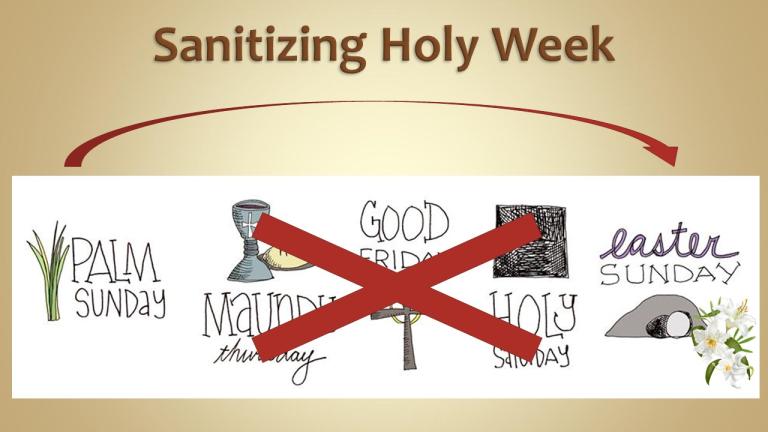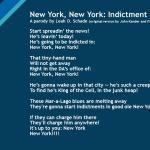A Palm Sunday sermon countering the violence of Christian Nationalism calls for trust in God and prophetic courage.

The reflection below is one I wrote for “Jesus and Justice in Public,” a study-action guide by the Wisconsin Council of Churches. They developed this guide to help the Church respond to the rising threats of White Christian Nationalism that have become increasingly violent and include attacks on our democracy. The guide offers hands-on ways that the Church has historically engaged in civic life and what these practices can look like in our modern context.
I was invited to write a series of homiletical helps so that preachers can connect these lessons to the readings in Lent from the Revised Common Lectionary for Year A. This reflection is for Palm Sunday. However, these essays can be used at any time of the year.
The gallows and the cross
At the January 6, 2021, insurrection on the grounds of the Capitol, there were public displays of two means of execution: a gallows for hanging and a cross for crucifixion. The violent mob planned to use the former to kill the Vice President and other elected officials. They used the latter as a source of prayer for the success of their endeavors.
It is tragically ironic that they missed the irony of their actions.
I mean “irony” in the literary sense, where, as in a Greek tragedy, the full significance of a character’s words or actions is clear to the audience but unknown to the character. Did they not realize that the very cross symbolizing their faith was used to execute Jesus, a political prisoner of the Roman Empire? What level of cognitive dissonance is required to miss the parallels between the throng calling for Jesus’s execution on Palm Sunday and their own violent mob calling for the execution of political leaders?
Courage to preach the gospel in the face of violence
A preacher wanting to make this connection in a sermon on Palm Sunday between these two instances of political violence might risk pushback from congregants who would deem such a sermon “too political.” A sanitized version of Holy Week would move from palm waving this Sunday to the floral scent of Easter lilies the next, skipping all the betrayal, torture, violence, and death in between.

But such a side-stepping would be disingenuous at best and unfaithful to the gospel of Jesus Christ at worst.
The truth is that the sin of violence has been supported by Christianity in America for generations.
Says Carter Heyward in her book, The Seven Deadly Sins of White Christian Nationalism: “No one paying attention in America or in American churches could fail to notice that our national culture centers around a pride strengthened over time by the fondness of many white Christian American men (and some women) for wars, guns, conquest, police and military readiness, and scapegoating…‘others’ deemed alien, unpatriotic, or dangerous to the white Christian ‘all-American way’” (127).
Even in mainline denominations, there are many who lean towards the tenets of Christian Nationalism. As Pamela Cooper-White points out in The Psychology of Christian Nationalism, “statistics show that nearly two-thirds of mainline Protestants – members of the supposedly ‘liberal’ Christian denominations . . . agree with many of the sentiments, if not the actions, of the thousands who marched on the Capitol on January 6” (3).
So, what is the antidote to the ever-increasing spiral of violence in American Christianity?
The key lies in grassroots movements of nonviolent disobedience, such as the Poor People’s Campaign led by Rev. William Barber and Rev. Liz Theoharis. And SURJ (Standing Up for Racial Justice). As well as Faith in Public Life. Many of these movements trace their roots back to the One who led his own grassroots movement of nonviolent disobedience – Jesus Christ.
Palm Sunday and Holy Week show us what it looks like to refuse to escalate violence. And to refuse using violence as a means to achieve what one desires, whether interpersonally, politically, or spiritually.
Jesus built a diverse coalition of fisherman, farmers, homemakers, tax collectors, and teachers to cultivate peacemaking while disrupting a violent imperial system. Then he trusted the power of God to sustain the Beloved Community he started, even if it meant succumbing to death by the powers that relied on violence to retain their power. The resurrection validated that trust. And it is the source of our prophetic courage for continuing the nonviolent, creative, justice-building Beloved Community today.
Central Question, Central Claim, Central Purpose
(The Central Question, Central Claim, and Central Purpose statements are a way to organize and provide direction for a sermon that I developed in the book Introduction to Preaching: Scripture, Theology, and Sermon Preparation (Rowman & Littlefield, 2013). Here are possible Central Statements for a sermon countering the violence of Christian Nationalism on Palm Sunday.)
Central Question. What is the church’s role in deescalating violence and using nonviolent civil disobedience to counter the brutality of Christian Nationalism; and how can our faith strengthen us for this task?
Central Claim. Just as Jesus built a diverse coalition to cultivate peacemaking while disrupting a violent imperial system, so we can continue the work of the Beloved Community in the face of death-dealing powers.
Central Purpose. This sermon calls for trust in God and urges prophetic courage for continuing Jesus’s nonviolent, creative, justice-building Beloved Community today.
To see the full series of sermon helps, download “Jesus and Justice” here.
Read also:
More than Eco-Palms: Ecojustice and Palm Sunday
Ecological Stations of the Cross, 2023
Turning Earth into Golgotha – We Need an Eco-Resurrection

The Rev. Dr. Leah D. Schade is the Associate Professor of Preaching and Worship at Lexington Theological Seminary in Kentucky and ordained in the ELCA. Dr. Schade does not speak for LTS or the ELCA; her opinions are her own. She is the author of Preaching in the Purple Zone: Ministry in the Red-Blue Divide (Rowman & Littlefield, 2019) and Creation-Crisis Preaching: Ecology, Theology, and the Pulpit (Chalice Press, 2015). She is the co-editor of Rooted and Rising: Voices of Courage in a Time of Climate Crisis (Rowman & Littlefield, 2019). Her newest book is Introduction to Preaching: Scripture, Theology, and Sermon Preparation, co-authored with Jerry L. Sumney and Emily Askew (Rowman & Littlefield, 2023).













